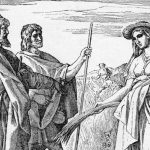A couple years ago, my social-media feed became awash in wave after wave of stories of women suffering heinous sexual exploitation.
African refugee women were fleeing their country to break free of sexual violence in their own homes, only to be raped by immigration workers or sold into slavery.
Two major news outlets reported from my own city of Silicon Valley that numerous women in the high-tech industry are being sexually harassed and propositioned by colleagues.
And in private, friends shared horrifying stories of young children committing sexual abuse against one another after being exposed to pornography.
Sadly, we could point to just as many examples today.
As a mother, the battle to keep fears for my daughters subsumed under trust in God’s sovereignty rages on, with no sign of waning. Moms without a foundation of faith have an even harder time knowing how to best guide their children toward adulthood amid such a sexually dysfunctional culture.
Culture: Both Villain and Savior?
A single mom named Jody Allard, herself a survivor of sexual assault, wrote an article lamenting her inability to persuade her teenage sons of the realities of sexual violence and their responsibility to work against it. She pronounced their resistance to her arguments as evidence that patriarchal culture had seeped into them, despite her efforts to keep it at bay.
Allard believes her sons’ thinking is externally driven by culture, with the solution also externally imposed through education. She’s disheartened that her efforts are failing, and she’s resigning herself to the fallout. Consequently, even her own sons, while loved, feel fundamentally unsafe to her.
The reactions to Allard’s piece were familiar, predictable even. She drew swift censure, particularly from conservative circles. But I understood her angst. I’ve walked with many women through the aftermath of sexual assault and abuse. I’m a Silicon Valley veteran with my own collection of sexual harassment stories. It’s hard to shake memories like the ones held by Allard, myself, and other women. When the penalty for the sins against us remains unpaid and justice has not been served, the drive to protect others from either perpetrating or suffering the same kind of harm is overwhelming.
But while Allard and I have similar experiences, we diagnose their root causes differently, with different prognoses for the future.
Allard sees humanity—especially humanity influenced by patriarchal culture—as “unsafe.” But the Christian worldview disagrees. The problem with Allard’s diagnosis is not that it’s too dark, but that it’s not dark enough. We are, all of us, far worse than merely “unsafe.” We’re capable of sheer evil. But just as Christians believe the problem is far greater, we believe just as strongly that there is an answer—one with power to not just make us safe, but to make us truly good.
Century-Spanning Problem
Few characters in the Old Testament exemplify this hope better than Boaz. He grew up in a culture that makes the darkness of our time seem light.
Judges 19 captures the totality of this spiritual darkness in Boaz’s hometown. A Levite and his Bethlehemite concubine are traveling and decide to rest for the night. They sit in the main square, hoping to be offered a place to stay, but no offer comes. At last a man stops, and he offers him a place for the night, with an ominous warning about not staying in the open square. We soon learn why.
In a plot twist worthy of the infamous fantasy drama on HBO, a lust-fueled mob surrounds the house, demanding the Levite be delivered over so they can sexually violate him. When the mob refuses to disperse, the Levite throws his concubine outside. They raped her and abused her all night until morning. At daybreak they let her go (Judg. 19:25).
As the sun rises, she collapses at the front door. Her husband cuts her dead body into pieces and sends them throughout the entire country of Israel, one piece to each tribe to confront them with their depravity.
Countercultural Man
Given the poisonous atmosphere in which Boaz was raised, we’d expect him to grow into a culture-mimicking man. But when we’re introduced to him, we meet someone altogether different.
Boaz is a wealthy landowner. When Ruth arrives, they’re in the process of harvesting—and fields of tall, uncut wheat are the perfect environment for women to be assaulted unobserved by male harvesters. Women with husbands or fathers to watch over them are guaranteed some measure of protection; widowed or foreign women are not.
When Boaz learns a woman who’s both a widow and also a foreigner has found her way into his fields, he provides for her physical needs in both word and deed. He offers her water and invites her to eat with him and his servants. Boaz goes above and beyond God’s laws that permit the poor to glean from his fields; he ensures Ruth will bring home grain to feed her and Naomi for weeks, not just days.
It’s not hard to imagine the scene as Ruth collapses at Boaz’s feet in gratitude and wonder at his kindness. And his answer moves me to tears each time I read it:
May the LORD bless you, my daughter. You have shown more kindness now than before because you have not pursued younger men, whether rich or poor. Now don’t be afraid, my daughter. I will do for you whatever you say, since all the people in my town know that you are a woman of noble character. (Ruth 3:10–11, CSB)
Boaz’s blessing over Ruth for her sacrifice and faith is profound. From his words, it’s obvious he remembers God’s laws to protect sojourners, a desire notably countercultural on its merits. But there’s likely a specific reason Ruth’s story moves him so deeply.
Ruth isn’t the first woman Boaz has known who has left her native land to seek refuge in Israel’s God and in Israel’s people.
Legacy of Protection and Faith
Several decades before Boaz and Ruth meet, Joshua sent two Israelite spies across the border of Canaan, to get a lay of the land as they prepared to invade it. The spies find lodging with a Canaanite woman named Rahab, who sold herself as a prostitute to support her family but who’s come to faith in the God of Israel.
She appeals to them, in the name of the Lord, to save her family. The men vow that if she protects them, they will rescue her and her family. When the time comes, the two spies make good on their vow. After that day, Rahab remains in the land of Israel, eventually marrying a nobleman and giving birth to a son.
That son is Boaz.
It’s possible, maybe even likely, that Rahab tells him about the concubine’s horrific death and dismemberment (Judg. 19:30). If so, surely she tells her son the story in the context of her own—what it felt like to be a woman so mistreated by men, how she came to faith in the true God of Israel, and how God’s people became a refuge, then a family—the family into which he’d been born.
Boaz’s words to Ruth show that he remembers his mother’s story. But his education doesn’t finally determine his actions. Boaz also trusts and follows Rahab’s God—the One is was her refuge, and the One who calls his people to emulate him.
In asking God to reward Ruth, Boaz embodies the reward God had given his own mother—one that wouldn’t terminate with him, nor with Ruth, but would continue through both of them to their grandson David and their greatest descendant, Jesus.
Replicating Boaz
God’s purposes for his people weren’t thwarted by the culture in which Boaz lived. The opposite was true—God’s purposes for Boaz and his descendants were accomplished in the middle of that culture, through people who stood against the culture by standing on the solid rock of the law and Word of God.
This is faithfulness we’re right to expect from God today. And integral to that plan are men who know God as a God of protection and refuge, and who give themselves to being a refuge and protector of women.
Ultimately, such men model Jesus, who gave himself up bodily to the point of death, to establish a kingdom and offer eternal life. Such men model our Savior, instead of our culture.
In that article, Allard lamented there aren’t men safe enough for her sons to emulate or for her to trust. I pray someone introduces her to the story of Boaz, and most of all to the story of his descendant Jesus—the man who isn’t just safe, but who is the ultimate embodiment of refuge and salvation.
A version of this article appeared at Fathom.
Is there enough evidence for us to believe the Gospels?
 In an age of faith deconstruction and skepticism about the Bible’s authority, it’s common to hear claims that the Gospels are unreliable propaganda. And if the Gospels are shown to be historically unreliable, the whole foundation of Christianity begins to crumble.
In an age of faith deconstruction and skepticism about the Bible’s authority, it’s common to hear claims that the Gospels are unreliable propaganda. And if the Gospels are shown to be historically unreliable, the whole foundation of Christianity begins to crumble.




































